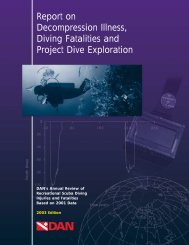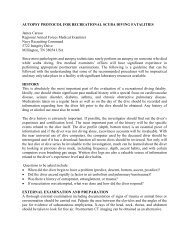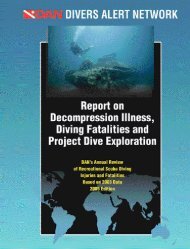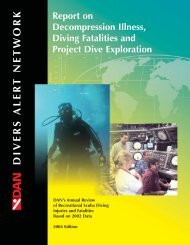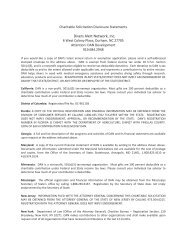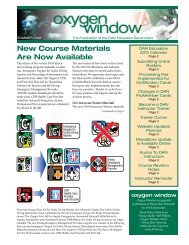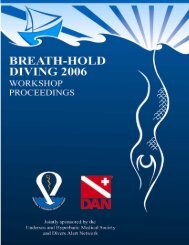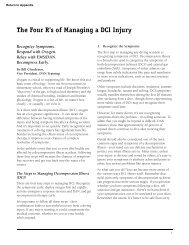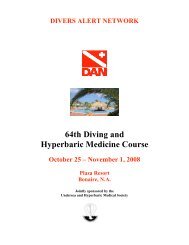Management of Mild or Marginal Decompression Illness in Remote ...
Management of Mild or Marginal Decompression Illness in Remote ...
Management of Mild or Marginal Decompression Illness in Remote ...
Create successful ePaper yourself
Turn your PDF publications into a flip-book with our unique Google optimized e-Paper software.
CARL EDMONDS: I don’t disagree with anyth<strong>in</strong>g that Des has said <strong>or</strong> will say <strong>in</strong> the<br />
future. However, it does w<strong>or</strong>ry me. I’m a bit like David. I am w<strong>or</strong>ried about the guy<br />
with two numb feet. I am w<strong>or</strong>ried about the guy with a hemidysesthesia, and I am<br />
w<strong>or</strong>ried about the guy with homonymous hemianopia, and I am w<strong>or</strong>ried a little bit<br />
about the guy who’s just lost his hear<strong>in</strong>g because that will come under sens<strong>or</strong>y<br />
changes.<br />
SIMON MITCHELL: Yes, but they’re objective.<br />
DES GORMAN: I would hope, Carl, that they’ll be picked up by that second<br />
Statement. But the very first vote we’ll take, Carl and David, will be on the way <strong>in</strong><br />
which sens<strong>or</strong>y change is expressed here. That’s the first th<strong>in</strong>g we’ll vote on, because<br />
there seems to be reasonable consensus about the rest – so we’ll vote on that first, but<br />
then we’ll vote on them as total comments.<br />
MICHAEL BENNETT: I’m probably just go<strong>in</strong>g to make the same po<strong>in</strong>t that the chap<br />
who r<strong>in</strong>gs us up from the airp<strong>or</strong>t (with the progressive numbness <strong>in</strong> his feet) is not<br />
go<strong>in</strong>g to have been exam<strong>in</strong>ed and can’t possibly fall <strong>in</strong>to this description. That’s my<br />
po<strong>in</strong>t.<br />
DES GORMAN: Bef<strong>or</strong>e we take the first vote, I’d <strong>in</strong>vite people from the wider audience<br />
to pass any s<strong>or</strong>t <strong>of</strong> op<strong>in</strong>ion <strong>or</strong> comment <strong>or</strong> illustration they’d like <strong>of</strong> these first two<br />
statements. Bob, I’d like you to see them together as a conjo<strong>in</strong>t. One <strong>of</strong> the th<strong>in</strong>gs,<br />
David, we may need to talk about later on is actually merg<strong>in</strong>g them, so that they’re<br />
actually not two statements but one statement and one qualifies the other, which I<br />
th<strong>in</strong>k would preclude that division that s<strong>or</strong>t <strong>of</strong> the f<strong>or</strong>ces <strong>of</strong> darkness might present to<br />
us <strong>in</strong> the legal sett<strong>in</strong>g.<br />
BOB WEBB: In terms <strong>of</strong> the second part <strong>of</strong> Statement 1, I see this as a beg<strong>in</strong>n<strong>in</strong>g to<br />
chang<strong>in</strong>g the way that we deal with the divers out there. We will be w<strong>or</strong>k<strong>in</strong>g with the<br />
dive <strong>in</strong>dustry, and I can see that if that second part is such a critical part <strong>of</strong> the def<strong>in</strong>ition,<br />
we might look at ways <strong>of</strong> try<strong>in</strong>g to get some s<strong>or</strong>t <strong>of</strong> neurological exam<strong>in</strong>ation<br />
done where the diver is. Whether that means tra<strong>in</strong><strong>in</strong>g our people, <strong>or</strong> whether we tra<strong>in</strong><br />
divemasters…. I’m wonder<strong>in</strong>g whether the term "medical" is go<strong>in</strong>g to limit us to a particular<br />
avenue. Maybe we should change it to "cl<strong>in</strong>ical" <strong>or</strong> some other term which<br />
allows us to use other avenues to exclude that neurological dysfunction.<br />
DES GORMAN: The Americans <strong>in</strong> the audience will tell you that the United States<br />
Navy has had just that s<strong>or</strong>t <strong>of</strong> approach <strong>in</strong> their divemasters f<strong>or</strong> a long, long time.<br />
They’ve actually taught them, I thought, quite a sensible neurological exam<strong>in</strong>ation<br />
which focused on the imp<strong>or</strong>tant th<strong>in</strong>gs like gait which are where all the clues are anyway.<br />
GLENN HAWKINS: One th<strong>in</strong>g that I was concerned about was lack <strong>of</strong> progression.<br />
Shouldn’t there be <strong>in</strong> part <strong>of</strong> the second statement that the symptom is not progress<strong>in</strong>g<br />
Because regardless <strong>of</strong> what you’ve got, if the person’s constitutionally gett<strong>in</strong>g<br />
194 <strong>Management</strong> <strong>of</strong> <strong>Mild</strong> <strong>or</strong> <strong>Marg<strong>in</strong>al</strong> <strong>Decompression</strong> <strong>Illness</strong> <strong>in</strong> <strong>Remote</strong> Locations W<strong>or</strong>kshop Proceed<strong>in</strong>gs





